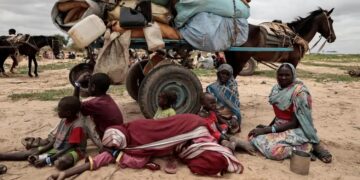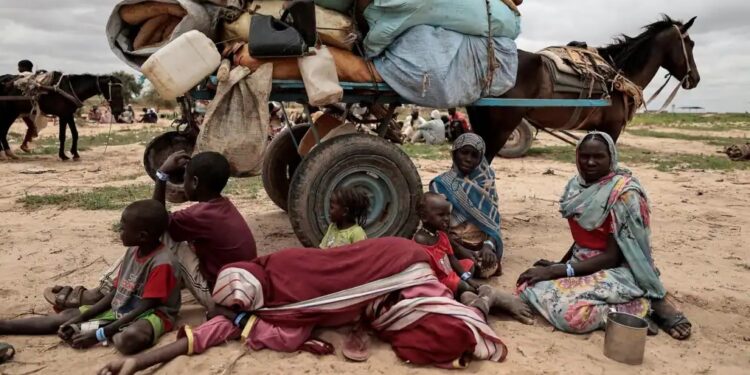By John Ikani
A new study has revealed that the death toll from the civil war in Sudan is much higher than previously estimated.
According to research by the Sudan Research Group at the London School of Hygiene and Tropical Medicine, over 61,000 people have died in Khartoum state alone since the conflict erupted last year.
The report indicates that 26,000 of those deaths were due directly to violence, while the majority succumbed to preventable diseases and hunger.
The situation appears even grimmer in other parts of the country, especially Darfur, where reports of severe atrocities and ethnic cleansing have surfaced.
Aid organizations warn that the 19-month conflict has triggered the world’s worst humanitarian crisis, leaving countless people on the brink of starvation.
Until now, the United Nations and various aid agencies had estimated the death toll at 20,000, based on confirmed cases.
Due to the chaos and ongoing fighting, there hasn’t been a comprehensive system to track the number of fatalities. In May, the U.S. special envoy for Sudan, Tom Perriello, mentioned that some estimates suggested as many as 150,000 lives could have been lost.
This new study comes amidst fresh accusations by Amnesty International that French-made military technology is being used in the Sudan conflict, breaching a UN arms embargo.
Amnesty reported that the Rapid Support Forces (RSF) militia, which is fighting against the Sudanese army, has been using vehicles equipped with French components, supplied by the United Arab Emirates.
“Our research shows that weaponry designed and manufactured in France is in active use on the battlefield in Sudan,” stated Amnesty’s Secretary General Agnès Callamard.
The rights group noted that these vehicles, spotted in Darfur, feature French-built hardware and have called out the French government to halt the supply.
Newsmen have sought responses from both France and the UAE, the latter having denied in the past that it provides arms to the RSF. The Galix defence system, produced by French companies KNDS and Lacroix, is reportedly used to protect ground forces against close-range threats.
Amnesty stressed that such weapons might facilitate severe human rights abuses, urging France to ensure its companies “immediately stop the supply of this system to the UAE.” The organization shared verified images showing destroyed vehicles in Sudan fitted with the Galix system.
According to Amnesty, France’s defence sector has strong ties with the UAE, supplying about €2.6 billion in military gear between 2014 and 2023, as per a parliamentary report. The rights group insists that companies must respect human rights obligations and conduct thorough checks across their entire supply chain.
The organization revealed it had reached out to the involved companies and French authorities, but no replies were received. Amnesty warned that if France cannot guarantee its arms won’t be re-exported to Sudan, “it should not authorize those transfers.”
The UN initially imposed an arms embargo on Darfur back in 2004, following reports of ethnic cleansing against the non-Arab population. Amnesty is now urging for this embargo to be extended across Sudan and for better monitoring mechanisms amid the civil war.
The rights group is calling on all nations to halt any direct or indirect arms supply to Sudan’s warring factions. The paramilitary RSF, led by General Mohamed Hamdan Daglo, has been clashing with Sudan’s regular army, commanded by Abdel Fattah al-Burhan, since their power struggle turned violent in April 2023.
The RSF faces accusations of ethnic cleansing in Darfur, which it denies, shifting the blame to local militias. Both sides stand accused of war crimes, with the relentless conflict resulting in thousands of deaths and the displacement of millions.
In August, a UN-backed panel of experts reported famine in parts of Darfur. A month later, the World Health Organization’s head, Tedros Adhanom Ghebreyesus, highlighted widespread starvation after a visit to Sudan, saying, “The situation in Sudan is very alarming… the massive displacement – it’s now the largest in the world, and, of course, famine.”
Despite the dire situation in Sudan, the international spotlight remains largely focused on conflicts in Ukraine and the Middle East. The study by the Sudan Research Group found that up to 90% of deaths in Khartoum were not officially recorded, hinting at a similar scenario in other regions.
However, lead researcher Mayson Dahab noted they lacked comprehensive data to estimate the full scale of deaths across Sudan or link all fatalities directly to the conflict.




































